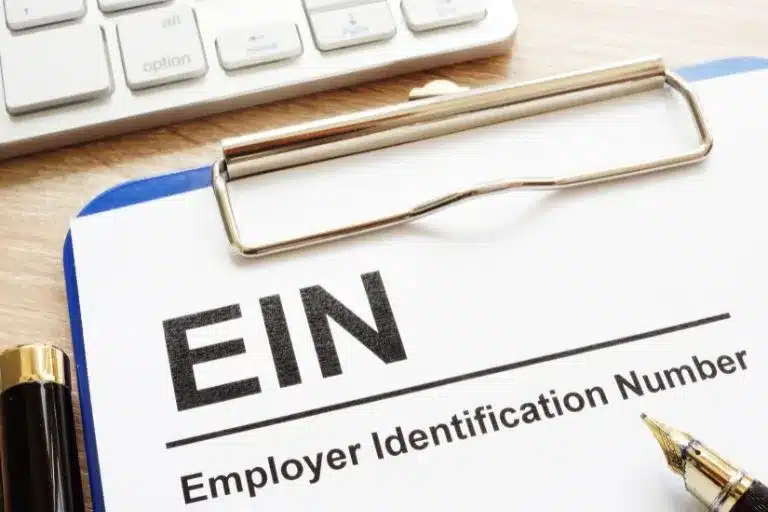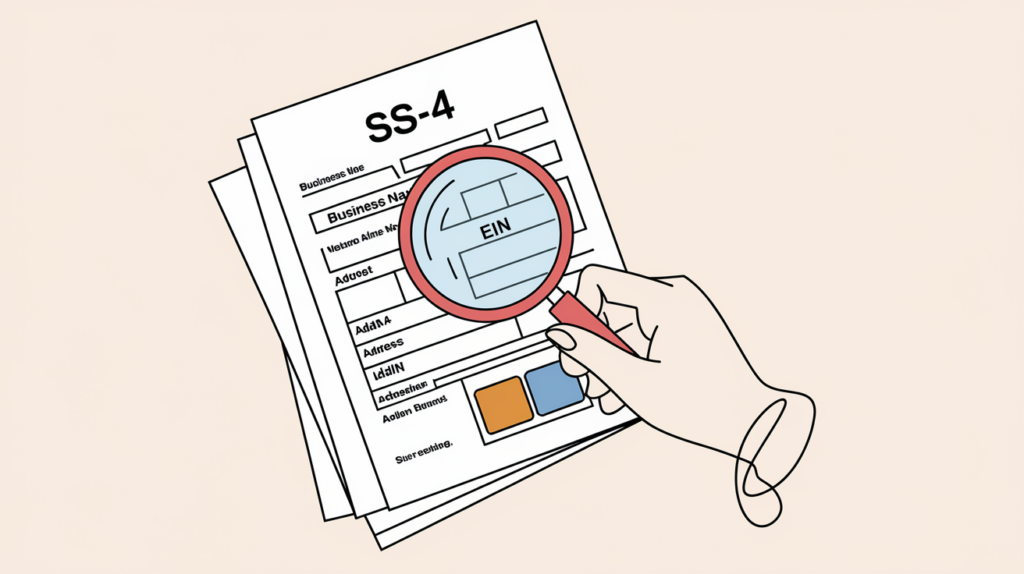Starting a small business involves many crucial administrative tasks. One of the most important is obtaining an Employer Identification Number (EIN), also known as a Business Tax ID Number. This guide explains what an EIN is, why you need it, and how to apply.
What Is an EIN and Why Do You Need One?
An EIN is a unique nine-digit number assigned by the IRS to identify your business for tax purposes. It’s similar to a Social Security Number (SSN) for individuals. While SSNs and ITINs (Individual Taxpayer Identification Numbers) identify individuals for tax purposes, EINs are specifically for businesses.
You’ll need an EIN if your business:
- Has employees
- Operates as a corporation or partnership
- Files tax returns for employment, excise, or certain other taxes
- Withholds taxes on income paid to non-resident aliens
- Uses a Keogh Plan
Even sole proprietors without employees can benefit from an EIN for opening business bank accounts, building business credit, and simplifying tax reporting.
The IRS offers an online questionnaire to help determine if you need an EIN. Take the questionnaire here.
Having an EIN provides several key benefits:
- Separates Business and Personal Finances: Crucial for accurate bookkeeping and tax filing.
- Builds Credibility: Enhances your business’s image with customers, suppliers, and financial institutions.
- Enables Hiring: Required for payroll and tax withholding.
- Facilitates Business Banking: Necessary to open a business bank account.
- Ensures Compliance: Helps comply with federal tax regulations and reduces the risk of identity theft.

How to Apply for an EIN
The easiest way to get an EIN is online through the IRS website. The application must be completed in one session, as it times out after 15 minutes of inactivity.
Before you begin, gather the following information:
- Your full name and SSN or ITIN
- Business name (if different from your own)
- Business address
- Reason for applying
- Business structure (e.g., LLC, corporation)
- Number of employees and date of first wages (if applicable)
- Principal business activity and primary product or service
If you can’t apply online, you can apply by fax, mail, or phone:
- Fax: Complete Form SS-4 and fax it to the IRS. Processing takes approximately four business days.
- Mail: Mail Form SS-4 to: Internal Revenue Service, Attn: EIN Operation, Cincinnati, OH 45999
- Phone: International applicants can call 267-941-1099.
Important: Applying for an EIN is free. Avoid third-party services that charge a fee.
Federal vs. State Tax IDs
An EIN is a *federal* tax ID. You might also need a *state* tax ID depending on your business location and activities. State requirements vary. Consult with a CPA or tax specialist or check your state’s revenue agency website for more information.
Frequently Asked Questions (FAQ)
Why might an online EIN application not be processed?
Why Might Your Online EIN Application Be Rejected?
If your EIN application isn’t processed online, it could be due to:
- Existing EIN Obtained Online: If your business has already acquired an EIN online, you may not qualify for another online request.
- System Limitations and Protocols: Some systems prevent multiple EINs for the same entity to avoid duplication.
- Security Measures: Enhanced security protocols may restrict online applications if there’s a risk of identity fraud.
Alternative Application Methods:
- Mail or Fax: Submit your application via traditional mail or fax as a reliable alternative.
- Phone Application: Some third-party services offer phone-based applications to expedite the process.
These steps ensure the integrity and security of your application process.
What defines a “responsible party” when applying for an EIN?
What Defines a “Responsible Party” When Applying for an EIN?
The “responsible party” is the individual with ultimate control over the organization. Key characteristics include:
- Ownership or Control: The person who owns or has significant control over the business.
- Individual, Not an Entity: Must be a natural person, not a corporate entity.
- Exclusions for Government Entities: Government entities follow different protocols for designating a responsible party.
This ensures accountability and compliance with IRS regulations.
What should exempt organizations know before applying for an EIN?
What Should Exempt Organizations Know Before Applying for an EIN?
Exempt organizations must:
- Legal Formation First: Ensure your organization is legally established before applying for an EIN.
- Understanding the Filing Requirements: Most tax-exempt organizations must submit annual information returns. Failure to do so for three consecutive years can result in automatic revocation of tax-exempt status.
- Timing is Key: The application date starts the timeline for your annual reporting obligations. For example, applying in November 2023 with a December accounting period requires the first return by May 15, 2024.
- Avoiding Revocation: Maintain compliance by filing necessary returns on time to preserve your tax-exempt status.
- Plan Your Accounting Period: Choose an accounting period that aligns with your operational and reporting needs.
Following these guidelines ensures smooth navigation through the EIN application process and maintains compliance with IRS requirements.
Where can employers find information about their tax responsibilities?
Employers can find comprehensive information about their tax responsibilities through the following resources:
- IRS Publications: Detailed guides on taxable wages, employment tax withholding, and required tax returns.
- IRS Website: Access to forms, publications, and online tools for managing taxes.
- Dedicated Hotlines: Contact the IRS for personalized assistance and information.
- Professional Advisors: Consult with CPAs or tax professionals for complex tax scenarios.
These resources provide the necessary information to ensure compliance with federal tax obligations.
How many EINs can be obtained per day by a responsible party?
How Many EINs Can a Responsible Party Obtain Per Day?
A responsible party can obtain only one EIN per day. This individual must be a natural person with ultimate control or ownership over the business. Government entities are exceptions and follow different protocols for EIN applications.
What happens if your EIN application session is inactive for 15 minutes?
If your EIN application session is inactive for 15 minutes, it will automatically time out. This means you’ll need to restart the application process from the beginning, as there is no option to save your progress and return later. To avoid losing your work, complete the application in one continuous session.
What are the operating hours for applying for an Employer Identification Number (EIN) online?
The online EIN application is available Monday through Friday from 7:00 a.m. to 10:00 p.m. Eastern Time. This schedule accommodates applicants across various time zones, allowing for convenient application submissions.
Steps to Obtain a Business Tax ID Number (EIN)
- Determine Your Need for an EIN:
You need an EIN if your business:
- Has employees
- Operates as a corporation or partnership
- Files tax returns for employment, excise, or certain other taxes
- Withholds taxes on income paid to non-resident aliens
- Uses a Keogh Plan
Even sole proprietors without employees may benefit from having an EIN for banking and tax purposes.
- Register Your Business with Your State:
Ensure your business is registered with the state where you operate. You’ll need your business’s legal name, address, and formation date when applying for an EIN.
- Gather Necessary Information:
Prepare the following information for your EIN application:
- Legal business name
- Name of the responsible party (owner or principal officer)
- Personal Tax Identification Number (SSN or ITIN) of the responsible party
- Business mailing address
- Type of business entity (e.g., LLC, corporation)
- Date of formation
- Expected number of employees in the next 12 months
- Date you started paying wages, if applicable
- Principal business activity and primary product or service
- Apply for Your EIN:
You can apply for your EIN through several methods:
-
- Online: Fastest method. Visit the IRS website and complete the online application. Receive your EIN immediately upon successful submission.
- Fax: Fill out Form SS-4 and fax it to the IRS. Processing time is about four days.
- Mail: Send the completed Form SS-4 to:
Internal Revenue Service Attn: EIN Operation Cincinnati, OH 45999- Phone: For international applicants, call the IRS at 267-941-1099.
-
- Save Your EIN Confirmation:
Once processed, save and print the confirmation document that includes your EIN. This serves as proof of your EIN assignment and is crucial for tax filings and other business operations.




 anywhere
anywhere  anytime
anytime